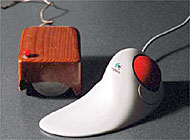
Logitech: Developing the mouse that roared

The widespread euphoria that swept the high-tech sector a couple of years ago has turned sour as thousands of fledgling companies continue to fail and many bigger fish see their share values decimated. But tucked away in canton Vaud, one enterprise is managing to ride out the storm.
Graduates of the Federal Institute of Technology in Lausanne set up Logitech in 1981. Originally, they planned to publish software programmes and established themselves as a consulting group, but they quickly identified a gap in the PC market.
They saw that the computer mouse was an essential accessory and began developing and producing products for computer manufacturers. These days, Logitech produces its own brand and sells directly to consumers.
It has also expanded into making other computer peripherals and reported a healthy net profit of SFr10.8 million ($6.3 million) for its April-June first quarter.
In a market that has become accustomed to profit warnings and falling share values, the news astonished most analysts who had expected a decline.
Not surprisingly, Logitech shares have soared this year, outperforming the Swiss market by around 70 per cent.
Logitech’s brand¶
Company spokesman Garreth Hayes attributes the performance to a change in strategy in recent years.
“We started out selling our mice to other companies so we were very dependent on sales of new PCs for our success, but in the last few years we’ve focused on developing our own brand and selling direct to end users.”
Hayes says there are between 400 and 450 million computer owners around the world and robust consumer sentiment has so far cushioned Logitech from the slowdown in the PC market.
Perhaps not wanting to appear overconfident, he quickly adds that Logitech is not completely immune to a slowdown. Around a fifth of the company’s business is still with major computer manufacturers and will be affected by the general atmosphere of belt-tightening. And if there’s a full-blown recession, no company will remain untouched.
But Logitech is sticking to its forecast of a 25 per cent growth in sales for the year and an earnings increase of up to 45 per cent.
The company now produces a whole range of computer accessories including cordless mice and keyboards, webcams and joysticks and steering wheels for the games market.
But the company cannot afford to stand still in what remains a rapidly evolving new economy. Companies have to keep a ready eye on the next stage of the digital revolution.
“Well there’s a lot of talk about the death of the PC and that’s a little exaggerated in our opinion,” says Hayes, “but that said, new platforms like the next generation consoles do give us an opportunity. We’ve recently launched a product for Playstation 2 that’s out first non-PC product and it’s been phenomenally successful.”
Hayes adds, however, that the core business will remain in computer accessories. He points out that of those 450 million computer owners, only around 2 per cent currently own products produced by Logitech.
Expansion plans¶
Logitech’s European headquarters remain in an industrial estate in Moulin du Choc several kilometres from Lausanne, while the corporate headquarters are in California. The company is listed on both the Swiss and American stock exchanges.
It employs around 4,800 people worldwide and about 160 in Switzerland. Manufacturing used to be centred in what is now the company canteen in Moulin du Choc but is now outsourced to Asia.
Not only is Logitech riding out the hi-tech shake-out but it’s managing to expand too. In March it bought the computer audio peripherals producer, Labtech, paying more than SFr200 million ($120 million).
Hayes says such acquisitions are unusual, however, with the company preferring to grow through partnerships with smaller enterprises.
And what of Logitech’s future? Will it remain in the countryside of canton Vaud or move to a more glamorous location in keeping with the company’s success.
“This is our emotional home,” says Hayes, “There are some real practical advantages such as being close to the Institute of Technology where many of our engineers come from. At some point we’ll have to move as the company is growing so fast but I’d be astonished if we left the region.”
by Michael Hollingdale

In compliance with the JTI standards
More: SWI swissinfo.ch certified by the Journalism Trust Initiative

























You can find an overview of ongoing debates with our journalists here . Please join us!
If you want to start a conversation about a topic raised in this article or want to report factual errors, email us at english@swissinfo.ch.